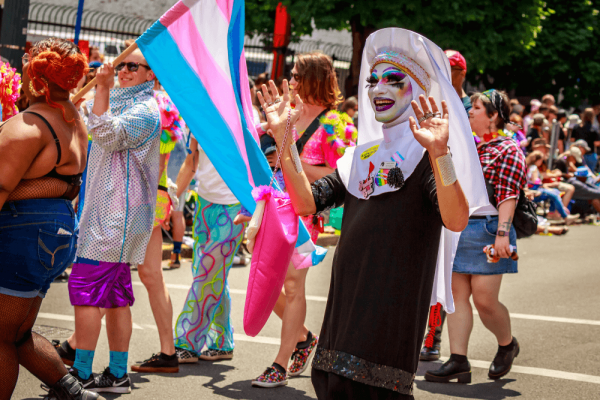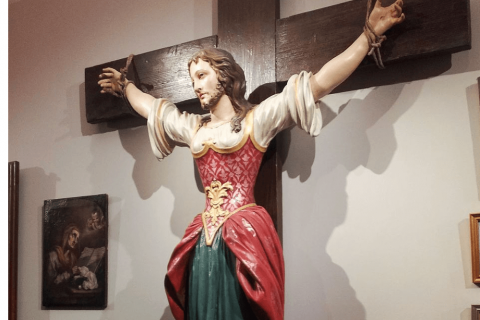
By Kaya Oakes
In the Venn diagram of sports and religion, there is no easy overlap. Early in May, the professional baseball team the Los Angeles Dodgers announced that they would be giving a community service award to the Sisters of Perpetual Indulgence, a group of “drag nuns” who began ministering to people with AIDS decades ago, and who continue to work with the LGBTQ+ community today.
The reaction from conservatives was operatic in scale, with everyone from Sen. Marco Rubio (R.-Fla) to Bishop Robert Barron decrying the invitation. Barron went so far as to refer to the Sisters as an “anti-Catholic hate group.” In other cases, conservatives called the decision “disrespectful” to Catholic nuns. But when the Dodgers rescinded the invitation on May 17, the outrage from liberals was equally strong. Openly gay California state Sen. Scott Wiener (D.-Calif.) praised the Sisters’ “lifesaving work,” and pressure against the Dodgers’ disinvitation was so widespread that team management issued an apology and reinvited the Sisters to the stadium.
As Pride month begins, it’s worth reflecting on some facts about Catholic history that have been lost in the finger pointing. Historically, there have been many Catholics who have pushed back against gender norms. But like modern conservatives who focus on the outrageous aspects of the Sisters of Perpetual Indulgence while ignoring the group’s tireless work caring for the sick, homeless, and poor, the Catholic hierarchy has also attempted to mute the stories of gender-nonconforming people throughout its history. And in doing so, the church hierarchy has often ignored the acts of mercy so central to Catholic teaching.
In the year 1429, prompted by a voice from God, Joan of Arc rode into battle in men’s armor. After aiding France in achieving multiple military victories, Joan was captured and put on trial for heresy and blasphemy. Among her supposed crimes was dressing like a man. At her trial, she was offered a dress to wear, but she replied that she preferred men’s clothing, because “it pleases God that I wear it.”
Julian of Norwich, a medieval mystic, referred to Jesus as “our precious mother,” and in case anyone missed the message, went even further, saying “God is also our mother.” Saints Euphrosyne, Anastasia the Patrician, Hildegund and others disguised themselves as men to enter monasteries. One of St. Francis’ closest friends was a woman he called “Brother Jacoba,” saints of many gender s were wed in “mystical marriages” to Christ, and some believe it was Mary Magdalene, the first to greet the risen Christ, who really led the church in the days after Easter.

But for those who are appalled by the sight of “drag nuns” in full beards and makeup, the most revealing story from Catholic history might be the medieval tale of St. Wilgefortis. The daughter of a king, Wilgefortis was promised in marriage to a man she didn’t want, and in answer to her prayers for liberation, God caused her to sprout a miraculous beard. Not only was this enough to repel her suitor, but it has also made her into a contemporary heroic figure for queer Catholics and women trying to kick off the shackles of misogyny and homophobia alike. Scholars sometimes arguethat these gender-nonconforming Catholics were more myth than reality, but regardless of the historical veracity, they remain beloved examples of courage and vocation, of living out a call to be their authentic selves while living a life of service.
Strikingly, “call” is the same word many members of the Sisters of Perpetual Indulgence use to describe their own vocations. There is an 18-month process of becoming a Sister, including doing charitable work in the community, which they call a “mission.” Sister June Cleavage told the LA Times: “You don’t come to this organization without understanding, without compassion and without having fought these kinds of battles before on a smaller scale.” And many of the Sisters have emphasized they are not anti-Catholic. In poking fun at the church, they believe they are helping to call out its hypocrisy; the Catholic Church has exhibited plenty of that — especially in terms of how it deals with gender.
But while many are rushing to defend Catholic nuns from the Sisters’ parody, the voices of Catholic sisters have been largely overlooked in this conversation. And Catholic sisters’ views on the Sisters of Perpetual Indulgence, as it turns out, are much more nuanced than those of Catholic leadership who claim the Sisters are dangerous.
In America magazine, Sister Jo’Ann De Quattro, a member of the Catholic order the Holy Names of Jesus and Mary, said the Dodgers made a mistake in disinviting the Sisters of Perpetual Indulgence because they engage in works of mercy. “It’s about trying to embrace people who might be different from us, because Jesus said, ‘Come to the table,’” she told journalist Michael O’Loughlin. “Not, ‘You don’t deserve a place at the table.’”
Sister Jeanne Grammick, the founder of Catholic LGBTQ+ support group New Ways Ministry, echoed this, saying in a statement that “there is a hierarchy of values in this situation. The choice of clothing, even if offensive to some, can never trump the works of mercy.”
As a Catholic born and raised in the Bay Area, for me, the Sisters of Perpetual Indulgence have always been a welcome sign of hard work, acceptance, and tolerance. In the ’90s, when Catholics largely turned their backs on people with AIDS, the Sisters rolled up their sleeves and got to work. Today, when queer kids turn up in the Bay Area having been rejected by their families and churches, the Sisters are there for them. The Sisters of Perpetual Indulgence marched with me and my friends at ACT UP rallies in the worst days of the AIDS epidemic; I once saw a Sister in full drag garb picking up trash in a park while rich techies tossed garbage onto the grass.
Of course, Catholic nuns have done this kind of work on the margins for centuries — and they have also been the subject of the church’s critique. In 2012, Cardinal William Levada accused U.S. nuns of disobedience and espousing “radical feminist themes” and subjected the nuns to a multi-year investigation supported by recently deceased Pope Benedict XVI. Women and gender-variant people, it seems, will always make the church uncomfortable. But we are often also the ones who hold the church accountable.
Meanwhile, the male hierarchy of the church is driving people away at unprecedented rates. Bishop Salvatore Cordileone of the archdiocese of San Francisco, where the Sisters of Perpetual Indulgence were founded, has doused the homeless with water to stop them from sleeping outside of the city’s cathedral; excommunicated politician Nancy Pelosi (D – Calif.) because of her support for abortion rights; called trans people a “threat” to the church; and tried and failed to force Catholic school teachers to sign a “morality clause” that would have, in part, effectively forbidden them from coming out at school. The Catholic church in the U.S. is hemorrhaging members, with younger Catholics the most likely to say that the church’s attitude toward LGBTQ+ people is a primary reason they leave.
It’s too soon to tell if this kerfuffle will push even more Catholics out of the church. But what it reveals about the lack of mercy many Catholics have in their hearts should be far more shocking than the sight of anyone dressed like an old-fashioned nun with a beard.
Complete Article ↪HERE↩!
